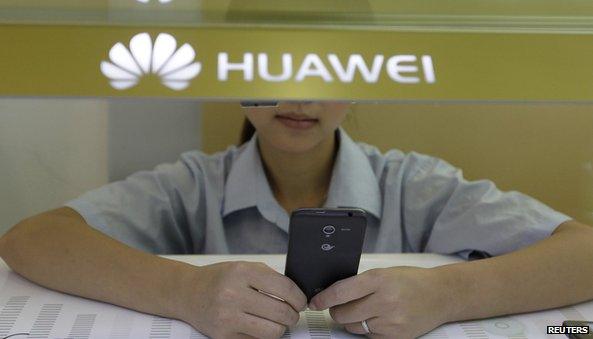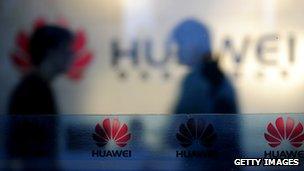Huawei and ZTE row: Should the UK be worried about the Chinese tech firms?
- Published

Huawei has defended itself against a highly critical US report, describing it as politically motivated
A report published this week has warned US companies to end dealings with two Chinese technology giants, Huawei and ZTE.
The House of Representatives Intelligence Committee directive was fuelled by fears of leaving the US open to espionage and cyber-attack.
Other countries, such as Canada and Australia, are also assessing the access they offer to overseas firms.
In the UK, Huawei in particular has a significant and influential presence.
The company, which began operating in the UK in 2001, said it has invested over £150m and created 650 jobs - resulting in deals with almost every major company in the UK's telecoms industry.
Huawei's technology can be found in broadband cabinets used by BT to get the internet to its customers.
TalkTalk, another major client, uses Huawei technology to run HomeSafe - a system to monitor the internet use of its customers in order to offer content filters and blocking of adult and other "unsuitable" content.
Huawei also produces set-top boxes for YouView - the new digital service backed by several UK internet service providers and broadcasters, including the BBC.
And when mobile operator EE launches the UK's first commercial 4G network, it will be powered by Huawei technology.
'Examine and evaluate'
So in light of the strong guidance from the US, how concerned should the UK be?
"The picture here in the UK is different," said Derek Smith, a cybersecurity spokesman for the Cabinet Office.
He explained that in 2010, a special cybersecurity centre was set up to examine Huawei's technology.
"It's there to evaluate the networks that are coming here into the UK.
"It enables the government here, our experts, to work with Huawei to have the necessary assurance that their products meet our security standards."
Since the release of the US report, both Huawei and ZTE have come out fighting, suggesting its findings were politically motivated.
"The report... which took 11 months to complete failed to provide clear information or evidence to substantiate the legitimacy of the Committee's concerns," a statement from Huawei read.
It went on to list the company's co-operation efforts, and compare the firm to a Silicon Valley start-up with "entrepreneurial spirit" with an "unwavering dedication to innovation".
But, with substantial numbers of cyber-attacks being traced back to China, there is increasing suspicion about its companies.
Equally many cyber-attacks - such as the infamous Stuxnet - are reported to have originated from within the US.
To quote several technology pundits, the situation is building into something of a Cyber Cold War.
'Taken note'
Following in the US report's footsteps, on Monday infrastructure giant Cisco ended its business deals with ZTE after its own internal investigation concluded that the Chinese company had sold Cisco products to Iran - in breach of trade sanctions.
In Canada, the government invoked a "national security exception" for hiring firms to build a secure communications network, allowing it to block those seen as a security risk. It did not single out Huawei or ZTE, but many have speculated the move was motivated by the US stance.
And Australia - which is developing a US $37.4bn (£23.3bn) national broadband network - has already banned Huawei from winning the lucrative contract.
Europe has not followed suit, and is playing its cards close to its chest. A trade spokesman told the BBC that the EU had "taken note" of the US report, but insisted: "This is an issue between the US authorities and the companies involved."
Huawei's UK clients too have been quick to justify their use of the companies.
A spokesman for TalkTalk told the BBC: "Huawei has been a partner of ours for a number of years, as it has been for most of the British telecommunications industry, and we will continue working with it.
"Any British company working with Huawei has been given clearance to do so by the necessary authorities."
Similarly, BT said: "BT's network is underpinned by robust security controls and built-in resilience.
"We continue to work closely with all our suppliers and the government, where appropriate, to ensure that the security of the network is not compromised.
"Huawei does not have any intelligent or processing components in BT's core network. We rigorously review and assure the security of our networks."
Globalisation challenges
But there are persistent worried rumblings. On Tuesday, the Guardian newspaper reported, external that Huawei might face a Commons inquiry into its operations in the UK.
Brian Honan, an information security consultant, told the BBC Huawei should be closely monitored - as should any firm offering such deep-rooted telecoms equipment.

Huawei said it will continue to work closely with the UK authorities
"One of the challenges we face these days with globalisation is that it's very hard to verify the supply chain," he said, touching upon worries shared by US authorities about malicious components being found in electronic equipment.
"In selecting whatever technology to use, proper risk assessment should be done, and controls put in place to monitor it."
The UK government argues that these worries are being addressed by working closely with Huawei.
"It's working, it continues to work, we have this partnership with Huawei where our experts work with theirs on the ground in the UK," said Mr Smith.
He added: "Investment in the UK also means providing jobs in the UK.
"Huawei could have stepped away and said no we don't want to do that. The simple fact is they wanted to work with our people to make sure their equipment met our robust standards."
- Published10 October 2012
- Published8 October 2012
- Published14 September 2012